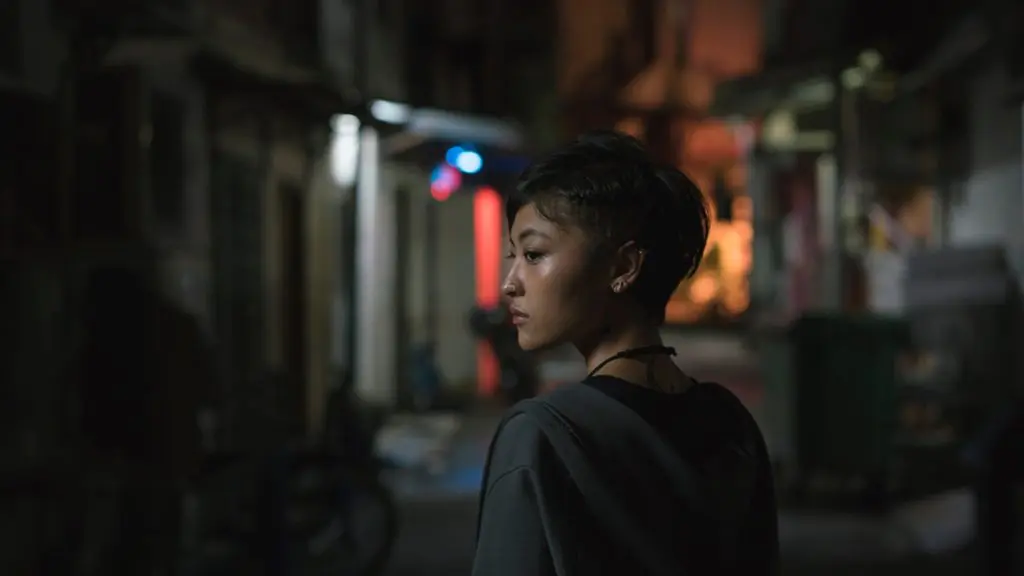Summary
Film noir on the surface, worldly-wise social commentary underneath, this is an excellent arthouse addition to Netflix’s international catalog.
A Land Imagined isn’t the oddest film I’ve seen this year, but it’s certainly the oddest I’ve seen on Netflix. Yeo Siew Hua takes his viewers on a stream of consciousness journey through the most neon and gritty parts of Singapore (like a present-day Bladerunner set), and the oddness is what makes A Land Imagined a success.
Lok (Peter Yu), a police detective, is investigating the disappearance of Chinese migrant Wang from a construction site, and then discovers his colleague Ajit is missing too. Lok tries to get to know their lives in order to track them down, visiting their dorms, social spaces and hangouts. Then A Land Imagined abruptly jumps back a few days to see Wang (Liu Xiaoyi) before he disappeared.
The film starts as a modem film noir, with a rainy night, neon and jazzy music: we think we know what we’re letting ourselves in for. But then gradually the atmosphere changes, and what we observe is as much social and political commentary as it is drama; the score is a decidedly lush electronics rather than jazz. The style and the content both come full circle to the end of the film so that although the mystery isn’t completely resolved, A Land Imagined is satisfying nonetheless.
Just as the film’s viewers may think they know what they’re watching, and find themselves reassessing, a couple of the characters have a similar feeling about the country where they live. Wang and his friend Mindy (Luna Kwok) spend some time together on the beach and muse that the sand is imported from Malaysia, with other reclaimed parts of the country apparently brought in from Indonesia and Vietnam. There is no clear sense of place in this film: the construction site and market could be anywhere, just as the people (and the sand) could be from anywhere. I’m sure this is quite deliberate, as is the sense that everything we see is man-made, and there is no peace to be found: even at night, there is noise or lights everywhere.

No wonder the main characters struggle with sleep as they do. Each of them is searching, and there is a half-awake or maybe-dreaming feel to much of their searches, via sand, computers, and intuition, which matches the slow pace of the film. That slowness was the only major flaw in terms of my experience with the film: it was apt, but it nearly lost my attention a few times, which was a rotten shame. Some have felt the music was overdone, and the editing underdone, but they were both spot on in my view. The almost constant nature of the score mirrored the man-made nature of the environment, with no natural gaps; and the change in style fitted with the changes in perspective. Transitioning from one perspective to another is not terribly clear, and neither is the realism vs dream of each perspective when we get there… But these people are sleepless, and the city as a whole doesn’t appear to sleep either.
I know I’ve gone on about the style and themes of the film, but the acting and production within A Land Imagined are superb too. The cinematography seems to focus on colors and sharp contrasts, but there is often a warm eye for detail too. The same can be said for the actors: Wang seems to be an everyman representative of migrants at first, but Xiaoyi brings out some detail in his character as the tale goes on. I must say I found his friend Ajit a little more interesting, though, perhaps because there were some explanations due but left out in his story.
A Land Imagined takes a look at migrants as an ignored demographic (amongst all the grains of sand in Singapore), just as Smaller and Smaller Circles considered the poor. Siew Hua uses the blend of styles and influences to keep his viewers on their toes and notice the subtle messages. I have no doubt at all I would remember them if I were to visit that city myself.
A Land Imagined was a success in the art house festival circuit last year, most notably winning the Golden Leopard award at Lorcano Film Festival in Switzerland, the first film from Singapore to do so in its many decades. Now, Netflix has claimed distribution rights and added this film about loneliness in a crowded, cosmopolitan world to its crowded, cosmopolitan platform.




